10. Letter to William S. Williams, 8 May 1849, page 1
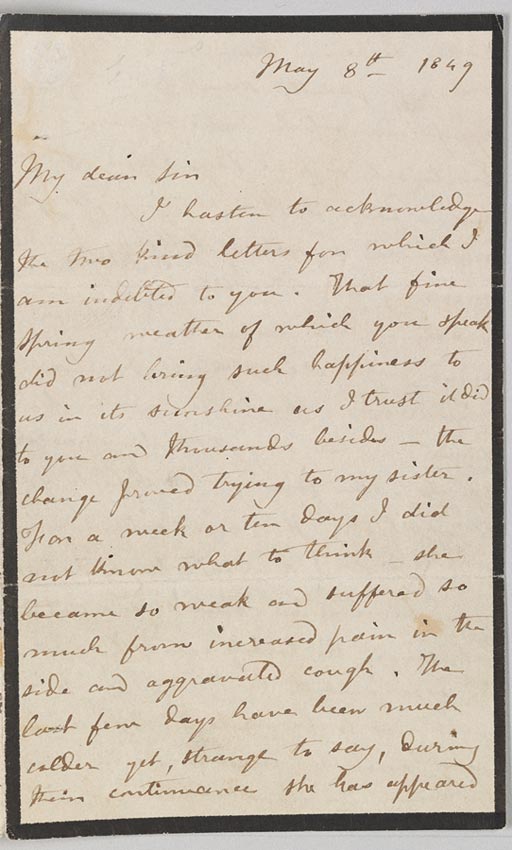
Letter to William S. Williams, dated Haworth, 8 May 1849
Henry H. Bonnell Collection, bequest of Helen Safford Bonnell, 1969
Brontë wrote this letter to her friend William S. Williams of the firm Smith, Elder, & Co., which had published Jane Eyre, to send him a wrenching update of her sister Anne’s decline. She wrote on black-edged mourning stationery, having recently lost her sister Emily and brother, Branwell, both of whom had died a few months before.
My dear Sir
I hasten to acknowledge the two kind letters for which I am indebted to you. That fine Spring weather of which you speak did not bring such happiness to us in its sunshine as I trust it did to you and thousands besides – the change proved trying to my sister. For a week or ten days I did not know what to think – she became so weak, and suffered so much from increased pain in the side and aggravated cough. The last few days have been much colder yet, strange to say, during their continuance she has appeared
Letter to William S. Williams, 8 May 1849, pages 2–3
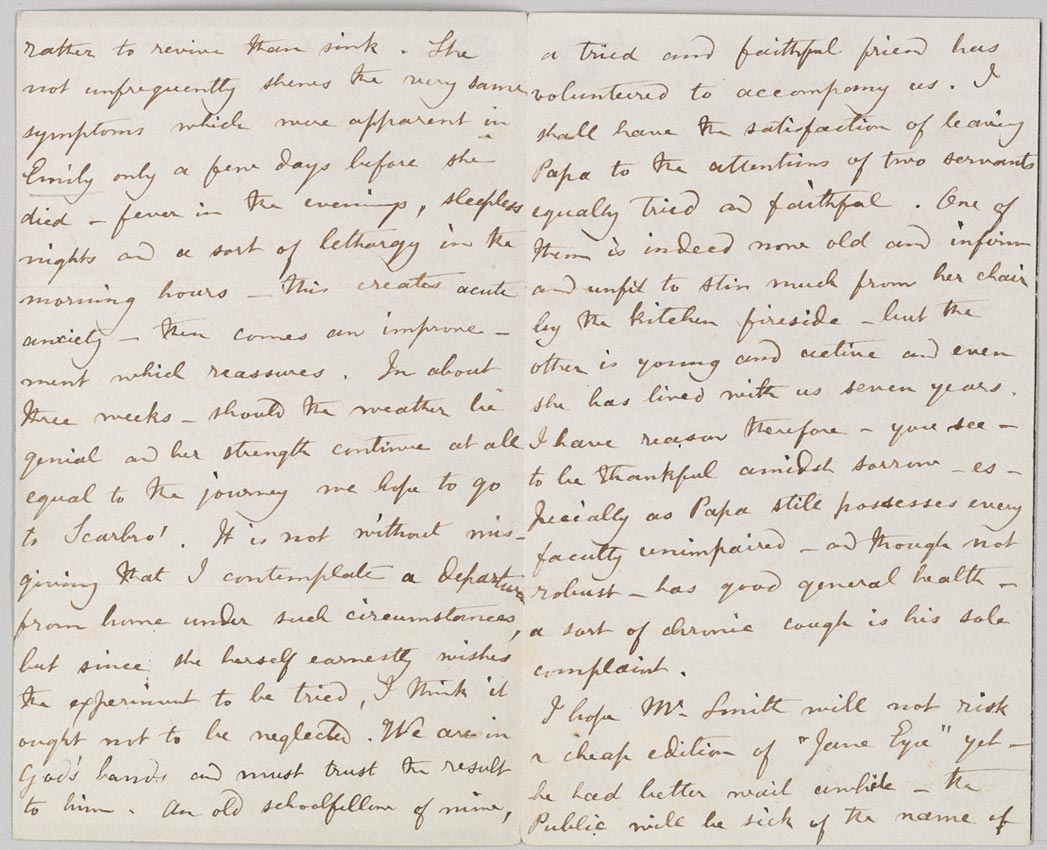
Letter to William S. Williams, dated Haworth, 8 May 1849
Henry H. Bonnell Collection, bequest of Helen Safford Bonnell, 1969
Brontë wrote this letter to her friend William S. Williams of the firm Smith, Elder, & Co., which had published Jane Eyre, to send him a wrenching update of her sister Anne’s decline. She wrote on black-edged mourning stationery, having recently lost her sister Emily and brother, Branwell, both of whom had died a few months before.
rather to revive than sink. She not unfrequently shews the very same symptoms which were apparent in Emily only a few days before she died – fever in the evenings, sleepless nights and a sort of lethargy in the morning hours – this creates acute anxiety – then comes an improvement which reassures. In about three weeks – should the weather be genial and her strength continue at all equal to the journey we hope to go to Scarbro’. It is not without misgiving that I contemplate a departure from home under such circumstances, but since she herself earnestly wishes the experiment to be tried, I think it ought not to be neglected. We are in God’s hands and must trust the result to Him. An old schoolfellow of mine, a tried and faithful friend has volunteered to accompany us. I shall have the satisfaction of leaving Papa to the attentions of two servants equally tried and faithful. One of them is indeed now old and infirm, and unfit to stir much from her chair by the kitchen fireside – but the other is young and active, and even she has lived with us seven years. I have reason therefore – you see – to be thankful amidst sorrow – especially as Papa still possesses every faculty unimpaired – and though not robust – has good general health – a sort of chronic cough is his sole complaint.
I hope Mr. Smith will not risk a cheap edition of “Jane Eyre” yet – he had better wait awhile – the Public will be sick of the name of
Letter to William S. Williams, 8 May 1849, page 4
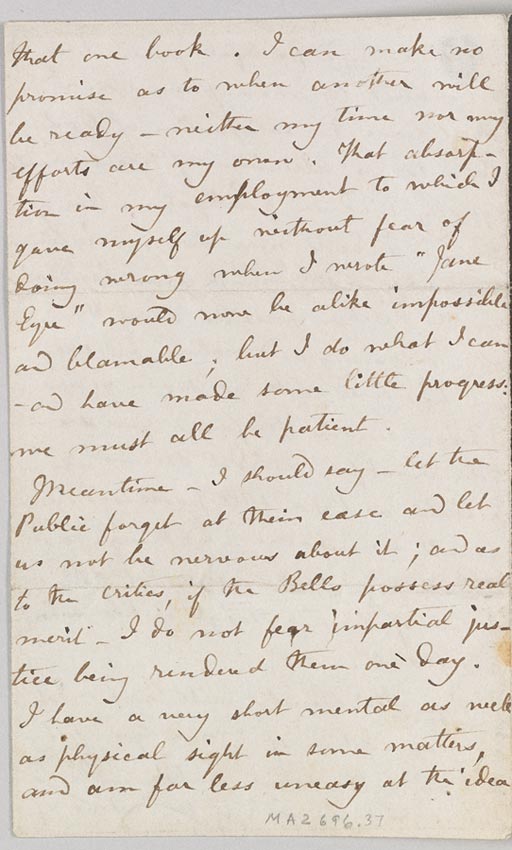
Letter to William S. Williams, dated Haworth, 8 May 1849
Henry H. Bonnell Collection, bequest of Helen Safford Bonnell, 1969
Brontë wrote this letter to her friend William S. Williams of the firm Smith, Elder, & Co., which had published Jane Eyre, to send him a wrenching update of her sister Anne’s decline. She wrote on black-edged mourning stationery, having recently lost her sister Emily and brother, Branwell, both of whom had died a few months before.
that one book. I can make no promise as to when another will be ready – neither my time nor my efforts are my own. That absorption in my employment to which I gave myself up without fear of doing wrong when I wrote “Jane Eyre” would now be alike impossible and blamable; but I do what I can – and have made some little progress: we must all be patient.
Meantime – I should say – let the Public forget at their ease and let us not be nervous about it; and as to the critics, if the Bells possess real merit – I do not fear impartial justice being rendered them one day.
I have a very short mental as well as physical sight in some matters, and am far less uneasy at the idea
Letter to William S. Williams, 8 May 1849, page 5
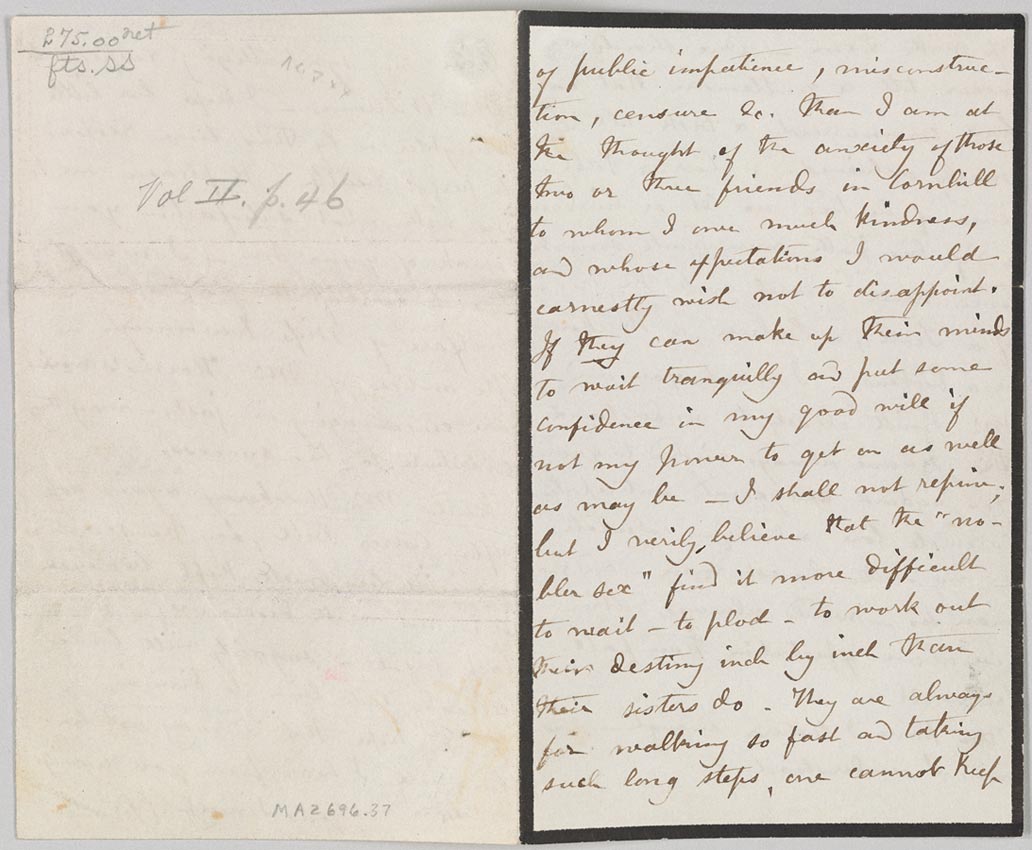
Letter to William S. Williams, dated Haworth, 8 May 1849
Henry H. Bonnell Collection, bequest of Helen Safford Bonnell, 1969
Brontë wrote this letter to her friend William S. Williams of the firm Smith, Elder, & Co., which had published Jane Eyre, to send him a wrenching update of her sister Anne’s decline. She wrote on black-edged mourning stationery, having recently lost her sister Emily and brother, Branwell, both of whom had died a few months before.
of public impatience, misconstruction, censure, &c. than I am at the thought of the anxiety of those two or three friends in Cornhill to whom I owe much kindness, and whose expectations I would earnestly wish not to disappoint. If they can make up their minds to wait tranquilly and put some confidence in my good will if not my power to get on as well as may be – I shall not repine; but I verily believe that the “nobler sex” find it more difficult to wait – to plod – to work out their destiny inch by inch than their sisters do – They are always for walking so fast and taking such long steps, one cannot keep
Letter to William S. Williams, 8 May 1849, pages 6–7
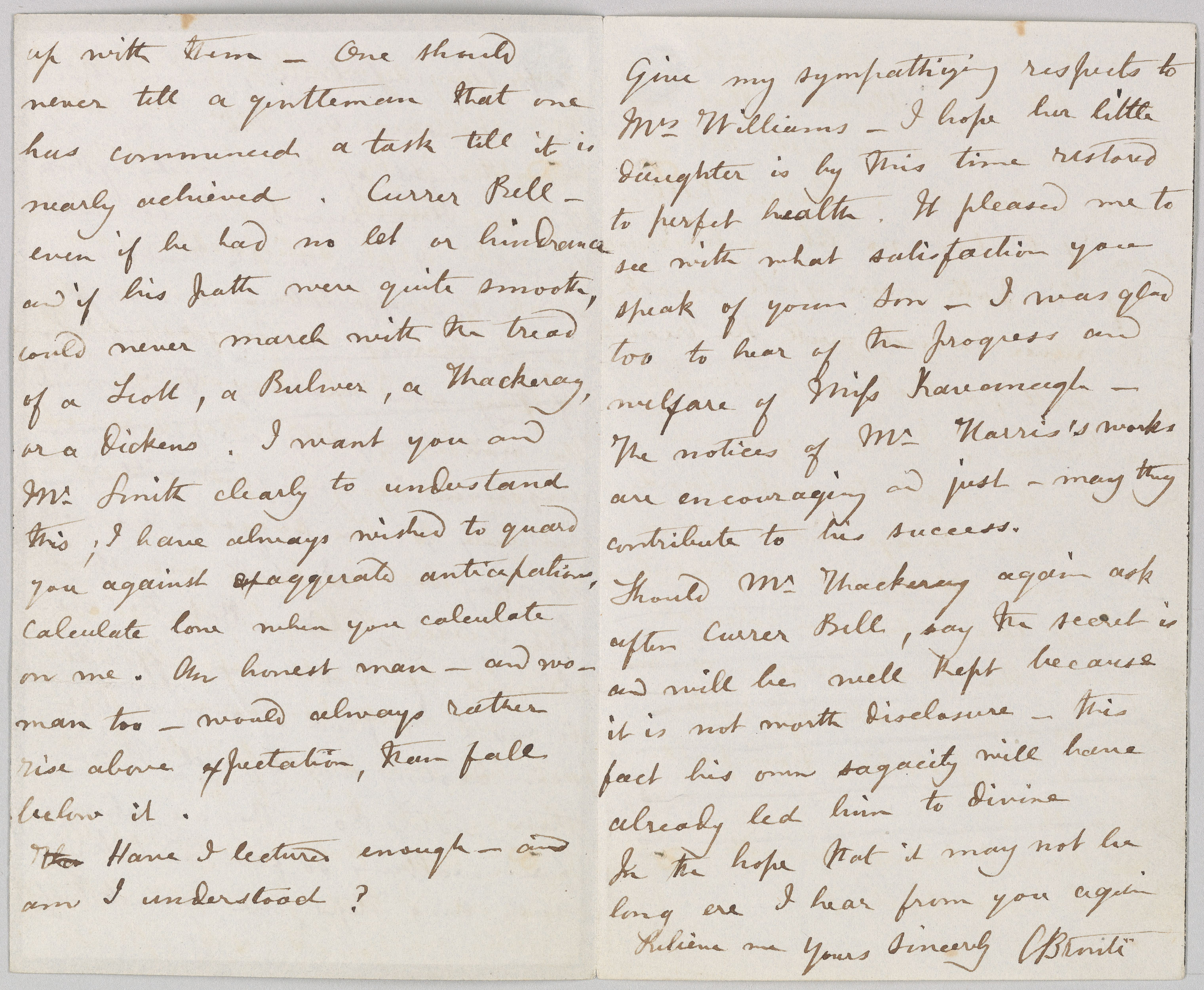
Letter to William S. Williams, dated Haworth, 8 May 1849
Henry H. Bonnell Collection, bequest of Helen Safford Bonnell, 1969
Brontë wrote this letter to her friend William S. Williams of the firm Smith, Elder, & Co., which had published Jane Eyre, to send him a wrenching update of her sister Anne’s decline. She wrote on black-edged mourning stationery, having recently lost her sister Emily and brother, Branwell, both of whom had died a few months before.
up with them – One should never tell a gentleman that one has commenced a task till it is nearly achieved. Currer Bell – even if he had no let or hindrance, and if his path were quite smooth, could never march with the tread of a Scott, a Bulwer, a Thackeray, or a Dickens. I want you and Mr. Smith clearly to understand this; I have always wished to guard you against exaggerated anticipations, calculate low when you calculate on me. An honest man – and woman too – would always rather rise above expectation, than fall below it.
The Have I lectured enough – and am I understood?
Give my sympathizing respects to Mrs. Williams – I hope her little daughter is by this time restored to perfe[c]t health. It pleased me to see with what satisfaction you speak of your Son – I was glad too to hear of the progress and welfare of Miss Kavanagh –
The notices of Mr Harris’s work are encouraging and just – may they contribute to his success.
Should Mr Thackeray again ask after Currer Bell, say the secret is and will be well kept because it is not worth disclosure – this fact his own sagacity will have already led him to divine.
In the hope that it may not be long ere I hear from you again
Believe me
Yours sincerely
C Brontë